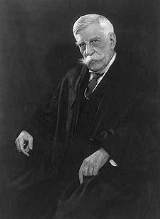
who served as an Associate Justice
of the Supreme Court of the United States
from 1902 to 1932. Noted for his long service, his concise and pithy opinions, and his deference to the decisions of elected legislatures, he is one of the most widely cited United States Supreme Court justices in history, particularly for his "clear and present danger
" majority opinion in the 1919 case of Schenck v. United States
, and is one of the most influential American common law
judges.
The life of the law has not been logic; it has been experience.![]()
State interference is an evil, where it cannot be shown to be a good.![]()
Free competition is worth more to society than it costs.![]()
We see what you are driving at, but you have not said it, and therefore we shall go on as before.![]()
But as I grow older I grow calm. If I feel what are perhaps an old man's apprehensions, that competition from new races will cut deeper than working men's disputes and will test whether we can hang together or can fight.![]()
I think it not improbable that man, like the grub that prepares a chamber for the winged thing it never has seen but is to be — that man may have cosmic destinies that he does not understand.![]()
Certitude is not the test of certainty. We have been cocksure of many things that were not so.![]()
The character of every act depends upon the circumstances in which it is done.![]()
The most stringent protection of free speech would not protect a man in falsely shouting fire in a theatre and causing a panic.![]()

